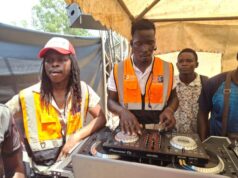- Commercial sex workers in Kenya said they are still recovering from the effects of COVID-19.
- They claim that they are obliged to seek alternative strategies for developing their businesses by opening WhatsApp groups.
- As a result, they have decided to digitize their business, specifically by forming WhatsApp groups led by industry professionals.
Anne Makau, 47, has been in the industry for 19 years and now leads the group on various social media channels.
“Covid-19 showed us hell, some of us abandoned the business and went back upcountry, some wrecked homes and stole husbands to survive that hard time,” she goes on to say.
During the rough times, Ms. Makau, a mother of two, explained that she had to think outside the box to survive in the city as the trade was hit hard by COVID-19.
The community began to revolt against the trade, and those identified as commercial sex workers became a target for societal retaliation.
“We lost two girls in Garsen and Bura towns, they were beaten by unknown people and later succumbed to injuries while receiving treatment in Malindi and Mombasa respectively,” she goes on to say.
Ms Makau stated that they were compelled to join a group of veterans where they discussed various ways to survive because the streets were proving unsafe for the women.
Each was responsible for organizing a meeting with the girls and brainstorming the notion of leaving the streets to meet clients online.
“Most of the clients know us and contact us for the girls, we know the girls better, we know those that are ailing and are in our counsel and care, therefore if someone comes without consulting, they have themselves to blame, these streets are not all safe,” she goes on to remark.
In December, the team created a WhatsApp group where all members can join for a charge of Sh500 and a monthly payment of Sh300 to save for additional expenses.
According to Ms Makau, clients contact the leaders, who then allocate the girls to serve at home or in hotels.
The client is also notified about the varying costs of services, among other needs.
“Some clients don’t want to use protection, in that case, we provide our ladies with test kits that have been made available to us for free by various organizations interested in our welfare,” she said.
As some clients prefer one partner, Ms. Makau says that the client is occasionally given additional options to create a balance in the trade and guarantee that everyone takes something home.
This has left the streets vacant, as the ladies of the night no longer have to wait for clients in the cold nights.
“It is safer for us, I don’t get to engage anyone in the streets as we fight for a client, sometimes the clients may want you at day,” Caroline Litei, a lawyer, explains.
According to Ms Litei, the trade is better than before COVID-19 because no one knows what she works for a living.
The present business model has provided a safe environment for all commercial sex workers and their families, as well as a better plan for business growth.
“From the Sh300 we contribute that goes to the Sacco as a lump sum, we can borrow money to start a business, we all want to leave this trade one day and settle in families like the rest of us,” she goes on to explain.







